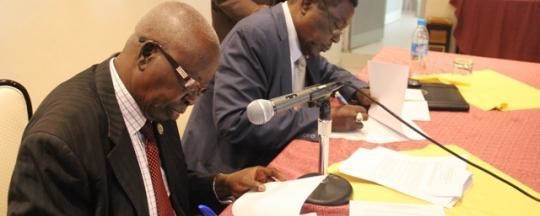The Jieng (Dinka) Council of elders responded on Sunday to accusations that it masterminded the proposal by President Salva Kiir to create 28 states, saying it bears no legal responsibility for the move because it is an advisory group only, not implementers.
“The buck stops with the president. The council made the suggestions as part of our contribution to resolving the conflict,” said Ambrose Riiny Thiik, head of the self-appointed racial council in an interview on Sunday.
He denied that the creation of more states in the country would breed more conflict and division. This comes after East African IGAD mediators called the 28-states proposal a violation of the peace agreement.
Ambrose argued instead that the IGAD-brokered peace deal between the government and armed opposition forces would be a recipe for another conflict if another solution is not proposed, which is why they came up with a proposal to divide the existing states.
“Imagine what would happen in states like Unity and Upper Nile where the agreement had given the rebels of Riek Machar to run the administration there. Even if the government and the president accept, what will the local people who did not join the rebellion say?” he said.
“Or what will the officers of the SPLA who did not change their allegiance and stood firm in defending the constitution despite the tribal undertones which characterized this senseless and destructive war to our people?” he asked.
Ambrose was referring to terms of the IGAD peace agreement that gave two of ten governorships to the SPLM-IO rebels.
He continued: “In our opinion as the council, the creation of more states will solve problems created by the agreement and more importantly it will enhance the implementation because there will be less competition over positions.”
“And in fact, the creation of the more states is to the advantages of the rebels. The power ratios will be applied as per the agreement. So they will continue to get what they would have gotten if the states remain to be 10. It does not affect the agreement in anyway,” he said.
The Dinka Council of Elders is a group of influential Dinka politicians and close relatives and allies of the South Sudanese president; it is not a group of traditional leaders. Earlier the group circulated a proposal for dividing South Sudan’s ten existing states into largely along tribal lines.
The group’s proposal included 24 states but Salva Kiir added four more states to the proposal before issuing his ‘Establishment Order’ on the matter on 2 October. Last week parliament voted on constitutional amendments that would give Kiir powers to create new states and appoint their governors and state MPs. Dozens of parliament members from non-Dinka tribes walked out before the vote.
File photo: Ambrose Riiny Thiik (left)
Related:
Map analysis: Ethnic balance to change if 28 states approved
Head of Dinka Council of Elders walks out of public debate
Ambrose Riiny Thiik denies having fueled war




